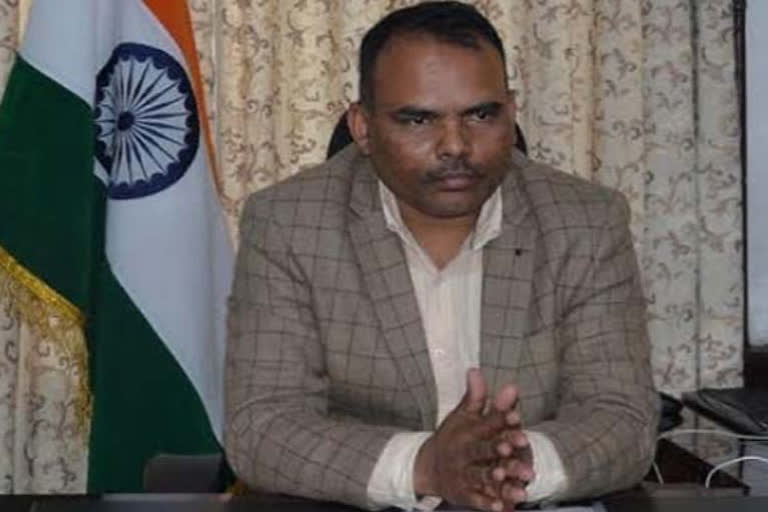Srinagar (Jammu and Kashmir): Following the downgrading of Jammu and Kashmir from a state into a Union Territory, the Narendra Modi-led BJP government has implemented Panchayati Raj Act's 73rd amendment in the region. By virtue of this amendment, 280 District Development Councils (DDCs) were formed in 20 districts of the erstwhile state. From November 28, the maiden eight-phase DDC elections are going to be held in Jammu and Kashmir.
In an exclusive interview with ETV Bharat, Divisional Commissioner Kashmir Pandurang Kondbarao Pole explained in detail the election process.
Since the abrogation of Article 370 and 35A, it is for the first time that any election is being held in the region and all the mainstream political parties of Jammu and Kashmir have fielded their candidates. The National Conference, PDP, People's Movement, People's Conference and four other political parties have formed the People's Alliance for Gupkar Declaration and fielded united candidates in these elections and are participating to keep the BJP away.
Amendment of Panchayat Raj Act
The amendment to the law, affected by the Ministry of Home Affairs on October 16, will lead to the establishment of District Development Councils (DDC) whose members will be directly elected by voters. The amendments have been carried out by way of Union Territory of Jammu and Kashmir Reorganization (Adaptation of State Laws) Fourth Order, 2020 issued by Union Home Secretary Ajay Kumar Bhalla in exercise of powers conferred by Section 96 of the J&K Reorganization Act, 2019.
Read: Roshni Act: Farooq's sister, prominent hoteliers in second list issued by JK admin
Before abrogation of Article 370, the powers to amend the laws in Jammu and Kashmir rested with the Assembly. However, with the implementation of Jammu and Kashmir Reorganisation Act (2019), the powers are vested with the Ministry of Home Affairs.
The 73rd amendment to the Jammu and Kashmir Panchayat Raj Act, 1989 was a long-pending demand of the panchayat members associations here, but none of the elected governments amended the Act.
The amended Act has kept reservation for the Scheduled Castes and Scheduled Tribes and it states that not less than one-third of the total number of seats reserved shall be kept for women belonging to the Scheduled Castes or, as the case may be, the Scheduled Tribes.
Moreover, one-third (including the number of seats reserved for women belonging to the SCs and STs) of the total number of seats to be filled by direct election in every DDC shall be reserved for women.
As per the Act, the reserved seats shall be allotted by rotation to different constituencies in the district.
Read: Junaid Matoo elected Srinagar mayor for second time
DDC elections, composition and functions
In the erstwhile state of Jammu and Kashmir, in place of DDC, the governments would constitute District Planning and Development Boards. A cabinet minister would be the chairman of the board which comprised MLCs, MLAs, MPs and chairpersons of block development councils, urban local bodies as members besides district development commissioner.
The board would frame a yearly development plan and allot a particular budget for the development works.
According to the amended law, each district in Jammu and Kashmir will have 14 constituencies and each of the constituencies will have an elected member for DDC. The DDC members will then elect a chairperson and vice-chairperson. Members of Parliament will not be a member of the DDC as per the new act.
Once the DDCs are elected they will be empowered to frame and execute the entire development plan. A DDC will have jurisdiction over the whole district excluding the portions falling within the municipal limits.
Read: DDC polls: Farooq Abdullah says PAGD aims to restore Article 370 and Article 35A
The term of the DDC shall be five years except for holding common elections to all the tiers of the Panchayats simultaneously so that all the tiers have coextensive terms in the district and one third of the total number of seats for the office of Chairperson of District Development Council in the Union Territory of Jammu and Kashmir shall be reserved for women.
Each DDC shall have a Standing Committee for Finance, Standing Committee of Development, Standing Committee for Public Works, Standing Committee for Health and Education and Standing Committee for Welfare. Each Committee will consist of such number of members including its Chairperson as decided by the District Development Council so that all other elected members except the Chairperson and Vice-Chairperson shall be elected as a member in any of the Standing Committee and the number of members elected to each Standing Committee shall, as far as possible, be equal.



